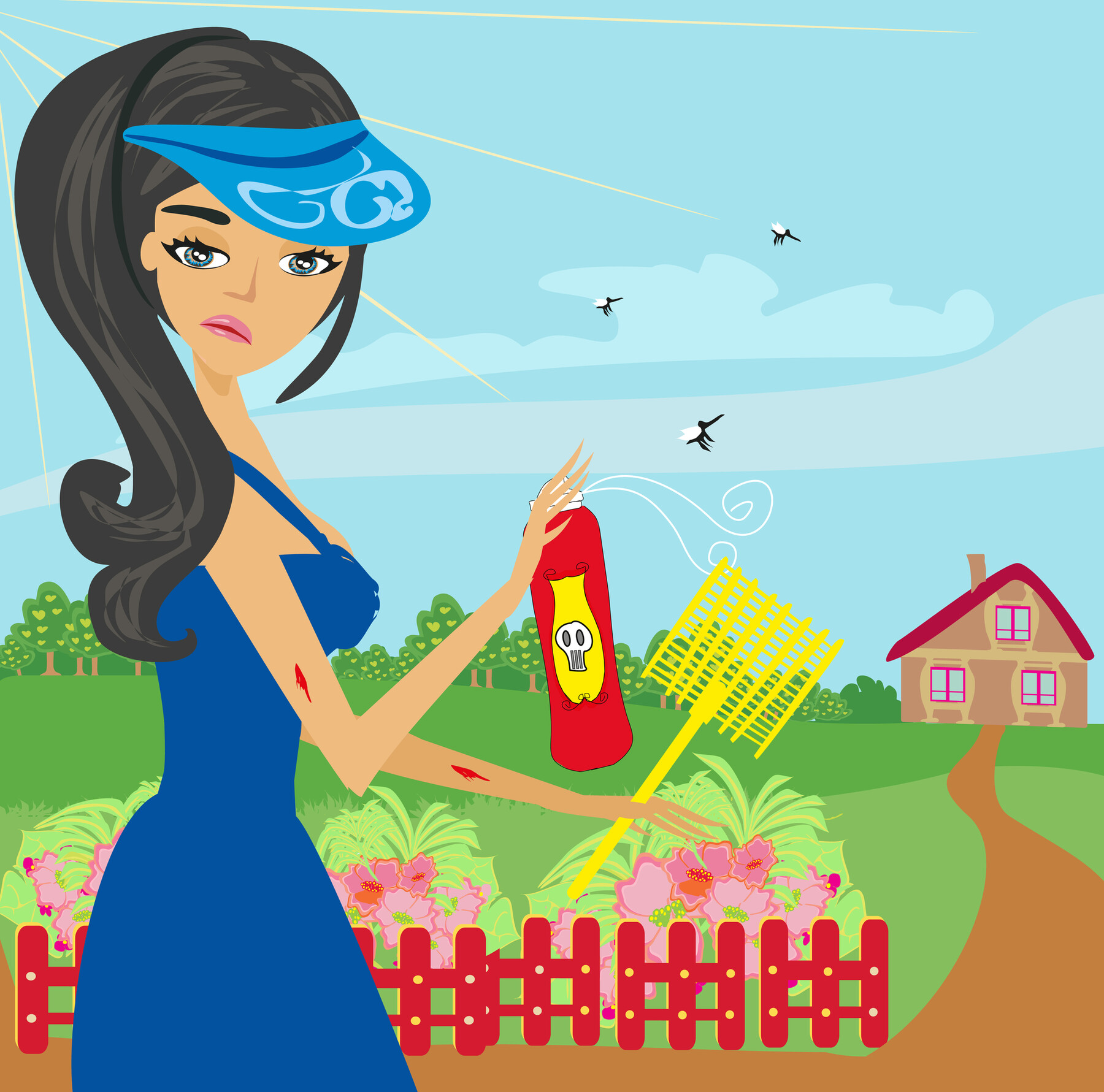Being a Summer Snack
~ by Carol Vartuli
Summer. It's synonymous with snacks, like potato chips, ice cream, or strawberry shortcake. But while we're savoring those tidbits, we too are tasty snacks--for mosquitos, chiggers, ticks, and other pests. Some, like flies buzzing a plate of watermelon, are merely annoying. Others can make us miserably itchy, or even infect us with disease.
Since we often don't see the attacker, how do we identify which culprits have assaulted us? And which of these tiny terrorists can we ward off?
Prevention Versus Avoidance
There are two broad categories of insect bites: preventable and non-preventable.
Stings from bees, wasps, and hornets, and spider bites cannot be prevented; we can only avoid areas of known infestation. Wasps and hornets often build nests near our homes, carefully tucked away among trees, light posts, or eaves. If you observe them in one of these areas, have the nest removed or keep your distance.
Spiders seem to live anywhere, including indoors. Most are busy catching flies and ants and don't seek out humans. But if you encounter a large web on your porch or patio, you may prefer to relocate the owner. Spiders rarely bite people.
Preventable insect bites include mosquitos, biting flies, gnats, chiggers, ticks, and fleas. Avoiding these creatures may be impossible, so protection is a wise choice, especially when you are in grassy or wooded areas, or encounter pets who have been outdoors.
Repellents can be effective, with the best protection from DEET-based products. Wristbands containing any type of repellent are not effective, according to Thomas Serbousek, MD, UnityPoint Health.
“The best protection from ticks consists of permethrin-treated clothing and gear, plus the application of a DEET-based repellent to exposed skin," advises Dr. Serbousek.
The most effective repellents against mosquitos contain picardin, and are effective up to 10 hours. These products are odorless, don't leave a residue, and are considered less toxic than DEET (which is also mosquito-effective).
Repellants with DEET are not effective against gnats, but PMD (p-methane-3,8 diol) products repel gnats well. PMD is the active ingredient in oil of lemon eucalyptus, and should not be used on children under three years old.
All repellants should be applied lightly to the skin, and not applied under clothing. If using sunscreen, apply repellant over it.
Treating Bug Bites
Sometimes it's difficult to know which 'bug' has bitten you. Symptoms like pain, itching, swelling, and redness are common in most bites.
Bug bites can usually be treated at home with cold compresses and/or a light application of over-the-counter cortisone cream. If these don't provide relief, or if the bite seems infected, see your primary care provider, who can prescribe medication if needed.
The least dangerous bug bites suffered in the Northeast are from new-born chiggers, tiny mites nearly invisible to the naked eye. These babies clump together close to the ground, in warm leaves and grass. Their bites cause a cluster rash that is intensely itchy, and the pests keep biting as long as they stay on your skin--up to several days. A hot, soapy shower of your full body, plus laundering any clothing or blankets that were exposed, should wash them away.
Mosquito bites are not usually dangerous, although infected mosquitos are known to spread diseases including Eastern Equine Encephalitis and West Nile Virus, both extremely serious, and found in areas of New York State each summer. Preventing mosquito bites, and eliminating any sources of standing water near your home or property offer your best protection.
Tick bites do not usually cause an immediate reaction, and ticks may remain on your skin for some time while feeding (up to two weeks). A tick found on the skin should be removed. Pull it straight out with tweezers--don't twist or squeeze it. Make sure the entire insect is intact, and save it in a sealed container for identification or testing. Tick-borne diseases, like Lyme disease, often cause flu-like symptoms and rashes. It's important to begin treatment for tick diseases as soon as possible. Preventing tick bites, and careful self-checks after outdoor activities, are the best protection against tick-borne disease.
Non-preventable Stings and Bites
Bee/wasp/hornet stings are usually unexpected, sudden, and painful. Cold compresses relieve the 'sting,' although the site may be sore for a few days. In rare cases, bee stings can cause an allergic reaction, which can lead to a condition called anaphylactic shock. Symptoms of anaphylactic shock include hives, wheezing, shortness of breath, and abdominal pain. Individuals who are allergic to bee stings should always carry an Epi-Pen with them.
Spiders rarely bite people; in fact, fewer than three people in the United States die each year from spider bites. Unless you see the spider that bites you, it's nearly impossible to confirm whether or not one bit you. BUT--if you visit an area of the country where poisonous Black Widows or Brown Recluse spiders are common (not in New York State), and suffer severe symptoms of a bite (pain, difficulty breathing, muscle cramping, headache, blistering, etc.), seek medical attention as soon as possible. Otherwise treat any suspected arachnid bite (spiders are not insects) at home, as you would a mosquito bite.
So enjoy the summer and be careful of tiny creatures who want to snack on you. Bug bites are annoying and some can really ruin your outdoor fun!
The information in the above article is not intended nor implied to be a substitute for professional medical advice, diagnosis, or treatment. Always seek the advice of your physician or other qualified health provider with any questions you may have regarding a medical condition.
